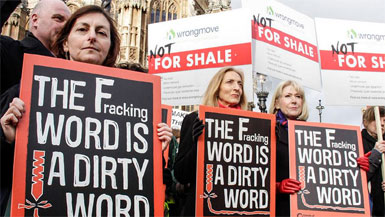Update February 12:
Can’t imagine why, but the UK parliament reversed its position – will allow fracking in national parks and areas of outstanding natural beauty as long as drilling begins at sites just outside the boundaries. They also failed to ban fracking in sensitive areas for drinking water. These two rules would have prevented fracking in almost half the country. See below.
—-
The UK government is divided on whether to pursue fracking even though citizens overwhelmingly oppose it, but Scotland declared a moratorium on it along with all unconventional oil and gas extraction.
The moratorium will remain in place until a full public health assessment is conducted along with full public consultation. The government says rather than an outright ban, they first want a full public debate.
We certainly didn’t get that chance here in the US.
Given that there’s plenty of evidence of health impacts from wide-scale fracking in the US, and that it’s banned in Ireland, France, the Netherlands and NY State, it would be surprising for Scotland to decide otherwise. Polls show a majority of people oppose fracking in Scotland.
Ban Fails in UK
Meanwhile, the Environmental Audit Committee – which consists of members of Parliament across political parties – wants it banned across the UK.
"Ultimately fracking cannot be compatible with our long-term commitments to cut climate changing emissions unless full-scale carbon capture and storage technology is rolled out rapidly, which currently looks unlikely. There are also huge uncertainties around the impact fracking could have on water supplies, air quality and public health," says Joan Walley, Chair of the Environmental Audit Committee.
The amount of solar doubled last year to almost 5 gigawatts, according to the Department for Energy & Climate Change, enough for 1.5 million homes. Solar can compete on price with natural gas by 2020 without subsidies if it has a level playing field. In January, wind supplied a record 14% of electricity, providing power to almost 9 million homes. Wind capacity reached 12 GW.
Prime Minister David Cameron still calls for "all out" fracking for its cheap gas and jobs, but with the public against it and elections coming up, conservatives backed down. They voted against a ban but went along with strong regulations. Labor abstained, leaving Liberal Democrats and Greens lacking the votes for a ban.
Instead, Parliament approved a host of regulations – which the US could learn from:
- Fracking will be banned in national parks and all protected areas, and near sources of drinking water – 40% of the country.
- Any potential fracking site must be monitored for a year before drilling can begin;
- Environmental impact assessments required at fracking sites; independent inspections required at wells;
- Methane releases must be measured and reported at each site;
- Chemicals used must be approved by the Environment Agency
- Individuals must be notified if fracking will occur near them;
- Planning authorities must have considered the cumulative impact of fracking in the local area and companies must leave the land in a condition they require;
And fracking will go ahead only if it is shown to be compatible with climate targets.
There are also calls for drilling companies to get permits only if they prove they will fully capture methane and assume completely liability for spills and other pollution events. They also want a mandatory distance between fracking sites.
What they didn’t approve tells a larger story, however. Parliament rejected an amendment from Liberals and Greens that would allow homeowners to say no to fracking on their property.
The Infrastructure Bill now goes to the House of Lords, where further amendments could be made.
As Parliament debated the topic, John Ashton, former Climate Envoy for the UK, spoke to protesters outside, calling for a full ban – that fracking is an insult to democracy. Here’s a brief excerpt:

"You can’t be in favour of fracking in Britain and in favour of dealing with climate change at the same time. It’s an either/or choice. Those who say it’s not are being ignorant, or deceitful, or deceiving themselves. It’s that simple.
"No community in Britain will ever benefit from fracking. If a few individuals or businesses do well, it will be at the expense of their communities. Fracking at scale is intrusive, disruptive, noisy, and unhealthy. It really does turn communities upside down. Look at what’s happened in the US.
We’re told we will have gold-plated regulation to protect our communities from all those harms. It’s a hollow promise. Actually it’s a lie. It’s a lie because our regulators just don’t have the budgets, the skills, or the people to enforce it properly. It relies entirely on self-policing by the companies concerned.
What’s been happening on fracking is not democracy in action. It’s democracy in free fall.
Read his speech:
